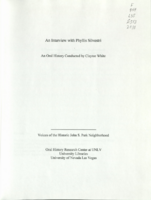Search the Special Collections and Archives Portal
Search Results

Transcript of interview with Charlene Herst by Barbara Tabach, September 09, 2016
Date
Archival Collection
Description
In 2014, Charlene, n?e Friedkin, Herst retired from her state government career, settled into volunteer work, being a mother and grandmother, and being a grant writer for others. After thirteen years in Carson City, she came back home to Las Vegas. Charlene was eight years old when her parents, Patricia and Richard Friedkin, moved their family to Las Vegas from northern California. She remembers vividly the hot day that they arrived and moved into a rental house in the desert across from Woodlawn Cemetery. Her father, formerly in the grocery business, found work at Vegas Village. Two years later they moved ?into Las Vegas at the very edge?which was Oakey.? She recalls people she has known since those first years who have been instrumental in the growth of Las Vegas; the challenges of being a divorced single mother of four; and the career path that began with an invitation from Gene Greenberg to apply for a part time position at Channel 3, where he was sales manager. At Channel 3 she quickly went from part time to full-time. She started the Community Projects Board, which brought together nonprofit organizations together at the studio in the 1980s to identify and develop marketing campaigns that addressed social issues in the community. Initiatives included Baby Your Baby and Smoking Stinks. While working for Channel 3, she also attended UNLV and received a communications degree in 1995. In 1997 she worked at Sierra Health Services in public relations. Then in October 2001, Charlene started her career in state government as the Nevada State Health Division?s Manager of the Tobacco Program. Over the course of her thirteen year career with the state, she was promoted to positions that continued her dedication to improving the quality of life of all Nevadans. She was instrumental in the implementation of the Nevada Clean Indoor Air Act (2006); improving prevention services to women; reducing the rate of substance use and abuse in the state. The date of her retirement, October 10, 2014, was officially proclaimed in honor of Charlene Herst by Governor Brian Sandoval.
Text

Transcript of interview with Gil Cohen by Claytee White, August 5, 2014
Date
Archival Collection
Description
Interview with Gil Cohen by Claytee White on August 5, 2015. In this interview, Cohen discusses growing up in Las Vegas and attending University of Nevada at Reno. He returned to Las Vegas to join the management training program at the Stardust. He talks about his friendships with Moe Dalitz and Carl Cohen, and his interest in golfing. He also discusses corporate ownership of casinos, unions, and his experiences working at different Strip hotels.
Gil Cohen came to Las Vegas in 1957, when was ten years old, when his father, Yale Cohen, was recruited by Moe Dalitz to work at the Stardust Hotel and Casino. Cohen graduated from University of Nevada Reno, and started working at the Stardust through the management-training program. In 1975, he was made hotel manager, his first of many leadership positions in Strip properties, which have included the Dunes, Aladdin, Hacienda and Monte Carlo, where he currently works as a casino host.
Text

Transcript of interview with Walter Weiss by Claytee White, November 2, 2010
Date
Archival Collection
Description
In this interview, Walter Weiss discusses how Judaism and boxing kept him out of trouble in his youth. Weiss grew up in the Boston area, and started boxing as a teenager. Weiss talks about his boxing training, becoming a runner for a bookmaker, and coming to Las Vegas in the 1950s to be a bookmaker for the Stardust Hotel, and working the slot machine floor. He had several different jobs in various casinos, and discusses different people involved in the gaming industry in Las Vegas.
Walter Weiss life story begins in a Malden, Massachusetts during the Great Depression. His early background was a blend of observant Judaism, secularism, and the effects of the era. He was a troubled youth whose older brother encouraged him to join him in boxing. As Walter explains: I was a wild kid and ... boxing saved my life. His aptitude for boxing led him to be a sparring partner in New York City's famous Spillman Gym. There he met and worked out with some of the greatest fighters of the era, including Rocky Marciano. He recalls how he turned professional while attending the University of Miami and how he first came to Las Vegas in 1958 to escape his personal troubles and find work with a local bookmaker. Thus began his diverse employment history in the casino industry. He details his various positions and the cast of famous and infamous characters of the times. For six years he return to New York and worked as a Wall Street broker before arriving back in Las Vegas in 1973. He talks about his property ownership, lobbying for an amendment to Senate Bill 208, his personal religious changes and a sundry of observations about the changes that occurred as the state took over gaming.
Text

Transcript of interview with Arne Rosencrantz by Claytee White, February 9, 2010
Date
Archival Collection
Description
In this interview, focused on the John S. Park neighborhood of Las Vegas, Arne Rosencrantz discusses his childhood growing up in Las Vegas. He talks about local businesses, including his father's furniture store, as well as schools and churches in the neighborhood.
Arne Rosencrantz remembers living on Beverly Way from 1954 to 1970. Like so many others from that era, he attended Fifth Street School, John S. Park Elementary School, John C. Fremont Middle School and graduated from Las Vegas High School. As a Jew, he was in a small minority, but fondly recalls growing up in the dense Mormon population of John S. Park Neighborhood. As a youngster, life in Las Vegas was filled with fun. The desert provided opportunity to hunt lizards and rabbits. Kids walked to school without concern. They played ball and found the Strip casinos welcoming to locals. He tells how the social issue of segregation of the 1960s did not affect him personally, but how local movie theatre owner Lloyd Katz fought to make his Huntridge and Fremont theatres integrated. He also reminisces about his father opening Hollywood Furniture and later Garrett's Furniture, which Arne operated until retiring in 2001. During the interview, he lists other furniture companies and the strong assortment of other retailers and restaurants that served the neighborhood.
Text

Transcript of interview with Herb Tobman by Deborah Fischer, March 13, 1981
Date
Archival Collection
Description
Interview with Herb Tobman by Deborah Fischer on March 13, 1981. In this interview on the subject of gambling, Herb Tobman talks about moving to Las Vegas while working for Standard Oil as a tire, battery and accessory salesman, then began working for the Moulin Rouge as the general manager in 1955. He gives a description of the hotels on Las Vegas Boulevard and downtown, and the "western" nature of town where people rode horses. Tobman then discusses the types of gambling that were popular: slot machines, blackjack and craps. He also talks about the accommodations (hotels and motels) available in the 1950s, transportation to and from the area, entertainment, and the economy. The interviewer continually asks Tobman to compare 1950s Las Vegas with 1980s Las Vegas in terms of the gambling environment.
Text

Transcript of interview with Leonard I. Gang and Roberta Gang by Barbara Tabach, September 14, 2016
Date
Archival Collection
Description
Leonard Gang (1935 - ) and Roberta Gang (1940 - ) are both natives of New York, though different boroughs and Jewish traditions. The couple met in 1960 while students at Cornell University and married in 1961. Two years later, Len graduated from New York University School of Law. Leonard had fallen in love with Western United States as boy on a family vacation. So when a notice was posted for a law clerk with the Supreme Court of Nevada, he knew he wanted to apply. When he presented Bobbie with a choice of Alaska or Nevada, she flatly responded that Nevada was as far west as she was willing to move. Thus, began their long and influential residencies in both Carson City and Las Vegas. In Las Vegas, Temple Beth Sholom was quickly a welcoming place to be for the Gang family. While Leonard?s law career flourished, Bobbie realized her energy and commitment to become an advocate for the benefit of the vulnerable. Over the years, she actively participated in the political campaigns of others and even entered the political arena herself, which she discusses in this oral history. During Leonard?s successful legal career, he held positions as Deputy District Attorney and Deputy Public Defender in Clark County and was in private practice. From 1971 ? 1974, he was District Court Judge in Clark County before returning fulltime to private practice. By 1988, Bobbie and Leonard had become forceful lobbyists including representing Nevada Women?s Lobby among others. In 2012, Bobbie received the Virginia Cain Progressive Award from the Washoe County Democratic Party for her leadership and dedication to the rights of others. In this oral history, the Gangs highlight their tireless efforts, the long list of political and civic leaders that they worked alongside of, some of Leonard?s high profile cases, and their Jewish heritage. They are parents of three: Lynne Moore, Karen Schnog, and Joshua Gang.
Text

Transcript of interview with Jacque Dvorak by Barbara Tabach, March 09, 2017
Date
Archival Collection
Description
Jacque Dvorak was born in London, England, in 1944. Two years later, her family immigrated to Canada and then in 1953 they fulfilled their dreams to reside in the United States. The Dvorak family settled in Long Beach, California where Jacque?s brother was born. In 1957, the Dvorak family relocated to Las Vegas when Jacque?s father, Sam, opened a 24-hour barbeque restaurant in Market Town with his brother Harry. While growing up in California, Jacque enjoyed dancing and being on stage. She found herself drawn to performance much like her mother, Irene, who was an entertainer in Great Britain. This enthusiasm served her well in her future retail career which included the opening of the MGM. Jacque attended Las Vegas High School and graduated in 1962. Taking full advantage of being a teenager in Las Vegas, Jacque remembers the days when the need to lock your doors didn't? exist. Though, Jacque describes being keenly aware of being Jewish and forming strong bonds within the Jewish community through BBYO and other Jewish organizations. She also recalls protesting during school prayer recitations in the 1960s. In this interview Jacque gives an insider?s perspective of growing up in Las Vegas and Jewish life in the city. Her stories range from tales of teenage fun to dealing with modern anti-Semitism in Las Vegas to the joy she has found in friendships in the community. Jacque has two children, Harry Fagel and Lisa Sokoloski.
Text

Transcript of interview with Dorothy Ross Fletcher by Sharon Hildebrandt, June 26, 1975
Date
Archival Collection
Description
On June 26, 1975, Sharon Hildebrandt interviewed Dorothy Ross Fletcher (born 1936 in Las Vegas, Nevada) about growing up in and living in Southern Nevada. Fletcher first talks about that various towns in which she lived while growing up before discussing the schools she attended. She also discusses the changes in schools, her involvement in politics, church activity, gambling as a recreational activity, and prominent visitors who came to Las Vegas. Fletcher also talks about living in Nevada during World War II, the atomic testing, environmental changes and extreme weather, and the social changes in Las Vegas. The latter part of the interview involves discussion of real estate, the introduction of air conditioning for cooling, changes on the Las Vegas Strip, recreational activities available to youth in Las Vegas and the increase in the nonnative population.
Text

Transcript of interview with Lyle and Mary Ann "Timbuck" Rivera by Claytee White, May 1, 2009
Date
Archival Collection
Description
The oral history interview of Lyle and Mary Ann "Timbuck" Rivera begins with the 1915 birth of Frances McNamee, Timbuck's mother, who had the distinction of being the eleventh baby born in early Las Vegas. Frances' father and grandfather who were attorneys for the railroad arrived in 1905 and became part of the historical roots of the community. Timbuck's memories also include landmarks and activities that were integral to the growing town, such as her mother's involvement in organizing the Junior League. Lyle Rivera, a relative newcomer, arrived in the 1940s and experienced what he describes as a life of "bouncing around" and being the only child of a single mother, a cocktail waitress at the Golden Nugget. Lyle would grow to distinguish himself within the community as a lawyer and community activist. He modestly mentions his achievements which included involvement with the UNLV Foundation, professional careers in both the Attorney General's and District Attorney's offices,
Text

Transcript of interview with Phyllis Silvestri by Claytee White, January 11, 2010
Date
Archival Collection
Description
As a young woman, Phyllis Silvestri made the adventurous decision to move to the United States. She was bom in Canada and lived there until her early 20s. Over the next few years, Phyllis and her friend Mona logged many miles, worked and visited several states. By 1953, Phyllis had met and married Vincent Silvestri, who worked at Bingo Palace, now the Sahara Hotel and Casino. Soon they had their first child and had bought a home on Santa Rosa. A few years later they were building a new home in the John S. Park area. She proudly recalls her husband's attention to details such as including lots of built-in features and a bomb shelter that represents the era. Phyllis talks fondly of the neighborhood, but also recalls her children not being allowed to play with some of the neighborhood children because they were of Italian ancestry.
Text
